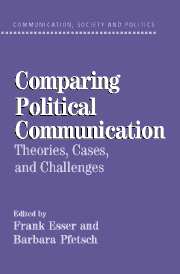Book contents
- Frontmatter
- Contents
- Contributors
- Comparing Political Communication
- INTRODUCTION
- I THEORIES AND METHODS
- II CASES
- 6 Global Political Communication: Good Governance, Human Development, and Mass Communication
- 7 Local Political Communication: Media and Local Publics in the Age of Globalization
- 8 Strategic Political Communication: Mobilizing Public Opinion in “Audience Democracies”
- 9 Political Campaign Communication: Conditional Convergence of Modern Media Elections
- 10 Political Communication and Electronic Democracy: American Exceptionalism or Global Trend?
- 11 Political News Journalists: Partisanship, Professionalism, and Political Roles in Five Countries
- 12 Political Communication Messages: Pictures of Our World on International Television News
- 13 Political Communication Effects: The Impact of Mass Media and Personal Conversations on Voting
- III PERSPECTIVES AND CHALLENGES
- Author Index
- Subject Index
- References
8 - Strategic Political Communication: Mobilizing Public Opinion in “Audience Democracies”
Published online by Cambridge University Press: 24 November 2009
- Frontmatter
- Contents
- Contributors
- Comparing Political Communication
- INTRODUCTION
- I THEORIES AND METHODS
- II CASES
- 6 Global Political Communication: Good Governance, Human Development, and Mass Communication
- 7 Local Political Communication: Media and Local Publics in the Age of Globalization
- 8 Strategic Political Communication: Mobilizing Public Opinion in “Audience Democracies”
- 9 Political Campaign Communication: Conditional Convergence of Modern Media Elections
- 10 Political Communication and Electronic Democracy: American Exceptionalism or Global Trend?
- 11 Political News Journalists: Partisanship, Professionalism, and Political Roles in Five Countries
- 12 Political Communication Messages: Pictures of Our World on International Television News
- 13 Political Communication Effects: The Impact of Mass Media and Personal Conversations on Voting
- III PERSPECTIVES AND CHALLENGES
- Author Index
- Subject Index
- References
Summary
The democratic systems of government are changing profoundly because the form of representation is fundamentally changing. This is the position defended by Bernard Manin (1995, 247–303) in his influential book on the principles of representative government, the term he uses for the form of government of Western liberal democracies. After the classical parliamentarianism of the nineteenth century and the party democracy that was established at the beginning of the twentieth century, according to Manin, representative government currently takes the form of an “audience democracy.” The characteristics of this new form of government include personalization of elections and the rise of experts in political communication, increasing importance of political offers formulated so vaguely that the governing elites possess a large maneuvering space, the omnipresence of public opinion, and the transfer of the political debate from the backrooms of parliamentary committees and the central offices of parties and associations to the public sphere.
Manin has formulated concisely what party and media experts have observed for quite a while. Party researchers point to the decline of the ideologically oriented and structurally rooted mass party and the rise of the “electoral professional party” (Panebianco 1988) or the “cartel party” (Mair 1997). This transformation has led, on the one hand, to the declining importance of the traditional party apparatus and of party militants, and, on the other hand, it has reinforced the importance of the party leaders and of the much more independent electoral audience.
- Type
- Chapter
- Information
- Comparing Political CommunicationTheories, Cases, and Challenges, pp. 184 - 212Publisher: Cambridge University PressPrint publication year: 2004
References
- 30
- Cited by

